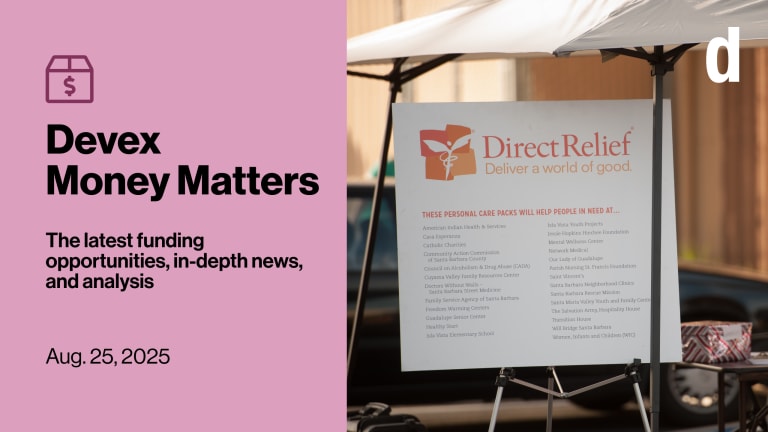
ISLAMABAD — When five Pakistani bloggers disappeared last January, it revived fears about the dangers for civil society in the country. The men were eventually released, but said they had been tortured while in illegal detention.
At the time, Shahzad Ahmad, founder of Pakistan-based NGO Bytes for All, was running a security training program for journalists and human rights defenders in Pakistan. The episode confirmed the need for the program in Pakistan. But in May, Ahmad received an email from his INGO funder to stop all trainings.
Closed offices, seized records, bureaucratic delays, and new laws targeting their work — these are just some of the ways that governments are cracking down against aid groups across the globe.
In this series, Devex will examine this shrinking civic space and go behind the scenes to understand why and how NGOs are being singled out — and how the impact resonates far beyond the borders of those countries involved.
“[The donor country’s] embassy in Islamabad informed our funder that anything to do with cybersecurity or digital security is not allowed in Pakistan,” says Ahmad. “We were told that this is a ‘foreign policy issue.’ It rattled us.”
In recent years, Pakistan has restricted the operations of international nongovernmental organizations and their local partners by refusing visas, introducing labyrinthine registration requirements, and requiring layered approvals for new projects. The importance that donors place on keeping the government happy, so that they can stay in country and operate smoothly, has become another lever that the government uses to restrict the activities of organizations that rely on international funds.
The scenario today contrasts with the decade after the September 11th attacks in 2001, when money poured into the country, making Pakistan one of the top destinations for foreign aid. Donors implemented projects unfettered. Civil society organizations boomed. Today, local organizations that depend on foreign funds are struggling as donors pull back.
As of 2013, government policies require groups receiving foreign funding to declare their finances and activities. Organizations must undertake a security clearance process similar to the Foreign Agents Registration Act in the United States, which was passed in 1938 to limit foreign propaganda. In interviews, donors, international NGOs, and local NGOs in Pakistan agreed, in principle, to regulation. But the current process is ad hoc, confusing, and the state’s capacity to implement it is weak. Laws governing civil society date back to the 1800s, and most of the procedures have no legal framework.
“The lack of regulation worked to advantage of INGOs and is now working against them,” says Mukhtar Ahmad Ali, a former information commissioner for Punjab province.“There is a lot of room for the government to be coercive and it would be legal. But the government is [now] doing a lot of things that are even outside of those laws.”
Mounting restrictions
The suspicion surrounding foreign-funded NGOs has grown with a series of incidents over the past decade. In 2010, the New York Times reported on a network of Pentagon contractors in Afghanistan and Pakistan tasked with collecting information on the inner workings of militant groups and tribal structures, treading a fine line between espionage and research.
Months later, in the aftermath of a U.S. Special Forces raid that killed Osama bin Laden, Pakistan’s intelligence agency discovered that the CIA had hired a doctor to conduct a fake vaccination campaign in order to collect DNA samples from a house they suspected to be bin Laden’s. The doctor had told his wife, friends, and ultimately his interrogators that he was working for Save the Children. InterAction responded by objecting to the use of humanitarian work as a cover for intelligence operations in a letter to CIA Director General David Petraeus. “The CIA’s use of the cover of humanitarian activity … casts doubt on the intentions and integrity of all humanitarian actors in Pakistan,” the letter stated.
In 2011, the Ministry of Foreign Affairs began requiring diplomatic missions and U.N. agencies to apply for and obtain permission to travel outside of federal and provincial capitals, in the form of a No Objection Certificate. For a time, the restrictions meant that Americans could not travel between their embassy and consulates without Pakistani government permission.
In 2015, a committee comprising of several ministries finally sealed Save the Children’s offices and instructed expatriate staff to leave the country. The committee also temporarily rejected the registrations of 15 other NGOs based on intelligence reports, including Oxfam GB, Norwegian Refugee Council, Danish Refugee Council, Catholic Relief Services, World Vision, and Mercy Corps. Oxfam GB has since been registered, while applications from many of the rest are still “in process.”
Popular right-wing evening talk shows exacerbated public suspicions of NGOs’ motives for working in Pakistan.
“The Save the Children episode was used as an excuse to hang all of us,” says Gulmina Bilal, founder and director of advocacy group Individualland. “Club that with talk shows who would do full programs naming donors and saying, ‘All these NGOs that are being funded by them, they are anti-state.’”
Labyrinthine, layered approvals
After the NGO expulsions, in 2015, the Ministry of Interior announced it would be taking over the registration process for INGOs from the Economic Affairs Division at the Finance Ministry, which is in charge of liaising with donors.
MOI chairs a multi-agency INGO Committee that reviews applications — examining financial statements, tax returns, annual plans, and staff details — and conducts a security clearance. If an INGO’s application is approved, they sign a memorandum of understanding, under which the organization agrees to seek new approvals before taking new funding or funding from new sources, or opening additional offices.
The American FARA is similar in its requirements, except that it only requires registration and disclosures, not approvals. Like the Pakistani process, it is overseen by intelligence officials.
Organizations in Pakistan say seeking approvals impedes their work because the ministry lacks capacity to manage the process efficiently. “You can write to the Interior Ministry, but there is no clear focal point in MOI, no set timeframe, and no clarity on how to get those approvals,” says a staff member of an NGO in Islamabad, who asked not be named so as not to be seen as criticizing the government.
The registration process was supposed to take two months, but two years after it begun, only 66 of 139 organizations have been approved, according to the ministry’s website. A total of 23 organizations have so far been rejected.
The MOI has instituted additional requirements: Administrative expenses must be capped at 30 percent, foreign national staff are capped at 10 percent, and Pakistanis must be given preference for key positions. Organizations must submit a third-party evaluation of their work every year, as well as performance audits.
Since last year, local NGOs receiving foreign funding have been required to seek a similar MOU, but through EAD. To apply for an MOU, the organization must first register under one of five laws that Pakistan has for setting up foundations, trusts, or not-for-profit companies. Which of these laws is best suited is often a question of government whims. Organizations need well-connected fixers to learn which registration offices have stopped accepting or processing applications and to navigate the process, according to the heads of several organizations who recently registered.
The next steps are not outlined anywhere: the organization must apply for not-for profit status through the Pakistan Center for Philanthropy and then apply to the Federal Board of Revenue for tax-exempt status.
“It’s fine to see what money is coming in, but it should be less confusing,” says Kishwar Sultana, director of Insan Foundation Trust, a human rights organization based in Islamabad.
Finally, organizations must submit 15 hard copies of all documents including annual reports for the past three years to EAD.
“Once an application is submitted to the EAD, then representatives of various security agencies start their endless visits to the organization and project areas, interviewing all staff members down to the [administrative assistants],” says the head of an NGO in Islamabad that works on governance. “The staff need to explain why they do any of the activities that they do, and still may be told to close projects without any explanation.”
Once an MOU is signed, this does not mean that the government will grant visas or NOCs. NOCs are required for each project and for international staff to leave Islamabad on project-related travel. Organizations say that getting NOCs for certain parts of the country, especially south Punjab, is near impossible.
These procedures aren’t outlined anywhere in Pakistani law, according to Mohammad Tahseen, director of South Asia Partnership Pakistan, or SAPPK. He fought and reversed an attempt to shut down his organization through the courts. The current laws that govern the registration of NGOs in Pakistan date back to the British colonial era or military regimes.
“These policies do not have any legal validity,” says Tahseen. “There is no law. It has never been discussed in the parliament. It can be challenged at any time in the courts.”
Filling the legal gap
Foreign-funded groups are coping with the new regulations by complying with them. Groups that work on human rights and democracy face extra scrutiny and harassment. One foreign-funded human rights organization told Devex they have been assigned liaison officers from MOI and the Inter-Services Intelligence, who are regularly in touch.
Local organizers expect that Pakistan will step up monitoring, harassment, and violence in response to dissent as Islamabad grows closer to China. The two countries have signed MOUs worth $100 billion for infrastructure projects, dwarfing the value of western aid.
The U.N. Office of the High Commissioner for Human Rights in August recommended that Pakistan update its laws governing foreign funding, which could close the grey areas the state today takes advantage of. Pakistan already has a Right to Information Act that can be used to legally acquire information about foreign-funded activities, according to Bilal.
“State agencies and security apparatus think anyone getting funding from outside for human rights work is working against Pakistan, against Islam, and against social norms and structures,” says Ahmed, of Bytes for All. “But if there is evidence that someone is anti-state, they should be taken to a court of law, not abducted and tortured.”
Read more international development news online, and subscribe to The Development Newswire to receive the latest from the world’s leading donors and decision-makers — emailed to you free every business day.




